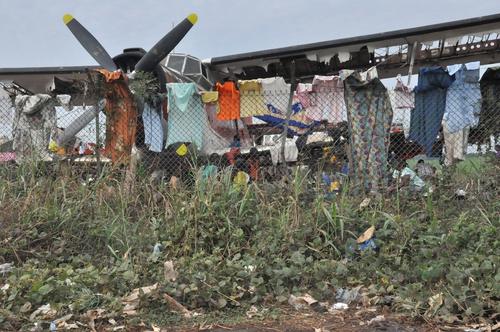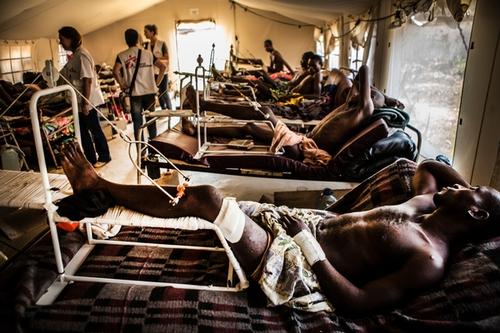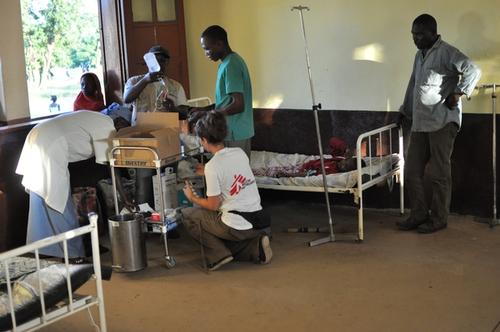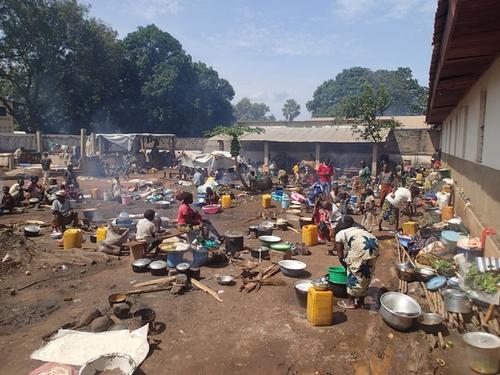Thousands of displaced have fled violence in Bangui, Central African Republic, regrouping in several sites around the city. Hundreds of wounded have been treated following attacks on the 5 December. Médecins Sans Frontières (MSF) is extending activities to continue to treat wounded and provide health services to around 14,000 displaced people in two of the main sites for displaced in the city.
Over the past two days MSF teams have treated 190 wounded in the Hospital Communataire of Bangui. Most have wounds caused by gunshots, or weapons like machetes and knives. The hospital is now overloaded with patients and the wounded continued to arrive today. An additional number of wounded are treated in the camps for the displaced and referred for further care if needed.
People wounded by attacks
“Until now we’ve been treating the influx of people wounded by attacks but we’re worried that the hospitalisation capacity of the Hospital Communautaire will soon be saturated,” says Marie Elisabeth Ingres, project coordinator in the hospital.
Our teams are strengthening hospital services by opening a second operating theatre, setting up three tents to increase hospitalisation capacity and are sending a second surgical team. Today, MSF has also started working in Castor Health Centre, treating patients with minor wounds and providing health services for pregnant women.
“There are also an increasing number of displaced families gathering in different sites around the city,” says Ingres. “They’re living in extremely precarious conditions and it’s urgent for more actors to mobilise and provide them with assistance.”
Mobile clinics
MSF is carrying out mobile clinics for around 14,000 displaced gathered in Bangui airport and in Don Bosco centre. We are providing health services to children under five, pregnant women, and the wounded who are referred to Castor Health centre or Hospital Communautaire if needed. In Don Bosco, teams are also installing hygiene facilities for the five to six thousands displaced who have gathered there.
Over the past few days fighting also broke out in Bossangoa, about 300 km north of Bangui. MSF teams treated around 20 wounded, and continue to provide healthcare and water and sanitation services to the 35,000 displaced people living in the town.
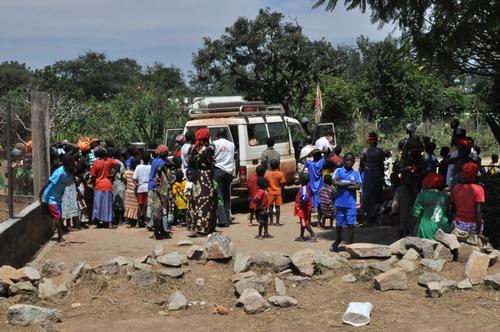
MSF has been working in Central African Republic since 1997, and now runs seven regular projects in Batangafo, Boguila, Carnot, Kabo, Ndéle, Paoua and Zémio and three emergency projects in Bossangoa, Bouca et Bria. A mobile emergency team provides care to Mbaiki and Yaloké zones, and we plan to begin activities in Bangassou and Ouango. In total, MSF is providing free medical care to about 400,000 people in the country, and more than 100 international and 1,100 local staff work in seven hospitals, two health centres and 40 health posts across the country.



